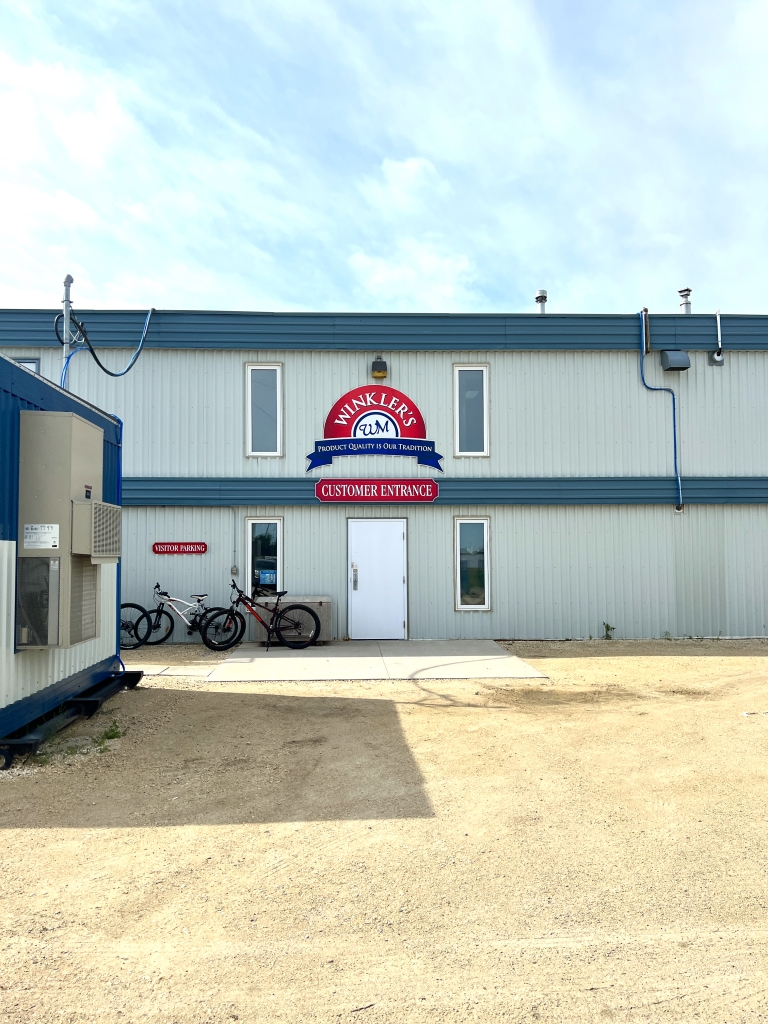
Winkler City Hall for recent announcement on
July 24th. Photo courtesy of John Sawatzky
Funding will support capital investments that enhance efficiency, productivity, and environmental sustainability
The expansion project for the southern Manitoba business is expected to create jobs and divert animals from export to the U.S.
An upcoming capital project at Winkler Meats in Winkler, MB, will increase the number of jobs at the facility from about 80 to 155.
The federal and Manitoba governments will spend nearly $2.4 million over two years through the Sustainable Canadian Agricultural Partnership capital infrastructure and investments program to support the project, which has a total price tag of $52.8 million.
Federal Agriculture and Agri-Food Minister Marie-Claude Bibeau and Manitoba Agriculture Minister Derek Johnson made the joint announcement in Winkler on July 24th.
The Manitoba government has approved over $7.8 million in loan financing and tax rebates in addition to the Sustainable CAP contribution.
Government funding will go toward new harvesting and processing equipment and a high-capacity packaging line. The expansion is a joint venture between Winkler Meats and Johnsonville Sausage, which sources some of its live sow supply from Western Canada.
The Ministers noted the project will increase the volume of harvesting and processing, which will advance value-added opportunities within Manitoba. More than double the number of jobs at the facility, to 155 full-time equivalent (FTE) positions. Enhance the resiliency and benefits of the existing supply chain. Divert millions of kilograms of live animals from export to the United States, reducing the number of trucks transporting live animals and associated freight-related greenhouse gases. It will expand the company’s contribution to Manitoba’s Gross Domestic Product (GDP) by five times to $23 million annually.
The project aligns with the Manitoba Protein Advantage Strategy, which aims to attract $1.5 billion in investments and create 1,550 new jobs in the animal and plant protein sector by 2025, said Manitoba Ag minister Johnson, adding that it will also enhance benefits for producers and processors through value chain collaboration.
The expansion work will happen in consultation with Efficiency Manitoba, which has identified opportunities for energy savings on the design and construction of the building to help it be more environmentally friendly and contribute to economic competitiveness with lower energy costs for the company.
Marie-Claude Bibeau, federal Minister of Agriculture and Agri-Food, said Manitoba’s agri-food processing sector plays a vital role in the province as an economic driver. With this investment, Winkler Meats can deliver more high-quality, value-added products.
“Working in collaboration with the partners in this project will strengthen the sector and supply chain and make it more sustainable.”
Derek Johnson, Manitoba Minister of Agriculture, said, “Our government is taking concrete action to accelerate development in Manitoba’s agri-processing sector by assisting with capital investments that enhance efficiency, productivity and environmental sustainability.”
Johnson said enabling companies to scale up production creates new jobs, supports the skill development of existing employees, increases the value and volume of Manitoba-processed foods and strengthens our province’s economic competitiveness.
Jeff Senebald, president of Winkler Meats, said, “We are grateful to receive support from Sustainable CAP and Manitoba’s Capital Infrastructure and Investment program. This further cements Manitoba as a leading protein centre in North America.”
Senebald said the occasion to partner with a company like Johnsonville to share respective skill sets to grow and improve the pork supply chain is an exciting opportunity for Winkler, Manitoba, and Canada.
Michael Stayer-Suprick, CEO of Johnsonville Holdings, said, “Johnsonville appreciates the collaboration with Winkler Meats, the Province of Manitoba and Canada. We’re confident that with our respective capabilities and experience, Johnsonville and Winkler Meats can continue providing a solid pork supply chain and quality products for retail customers and our end consumers.”
Rick Préjet, chair of Manitoba Pork, said it’s great for Manitoba’s hog sector to see this new investment in value-added processing right here at home, a shining example of Manitoba’s protein advantage. Fifty-five percent of agriculture and agri-food processing jobs rely on the hog sector and its producers.
“It excites us to build on the over 20,000 Manitobans that rely on our sector for a well-paying job across our province. These new jobs in Winkler are possible because of open trade between Canada and the United States. This announcement continues our crucial partnership with our neighbours to the south, a partnership that we must work to preserve.” •
— By Harry Siemens






